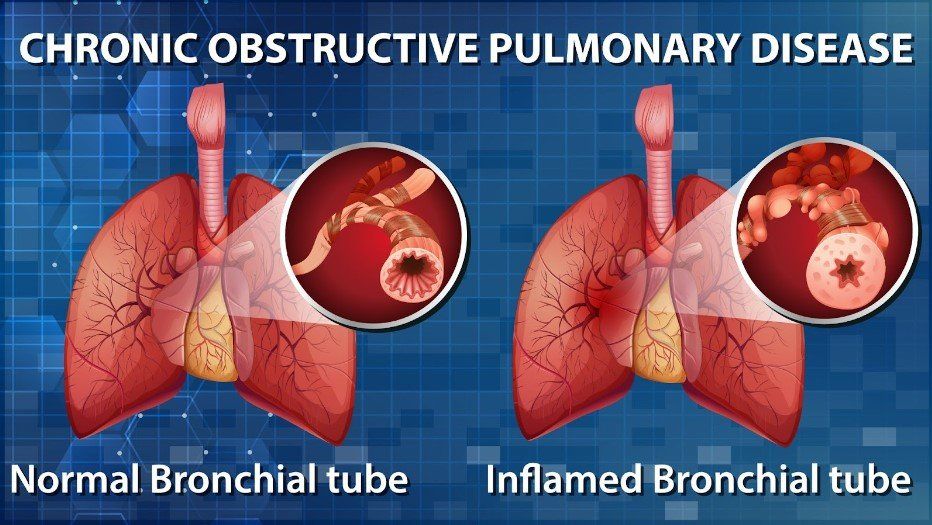Patient Resources
Chronic Obstructive Pulmonary Disease

A group of progressive lung diseases is referred to as Chronic Obstructive Pulmonary Disease (COPD). COPD may be brought on by chronic bronchitis and emphysema. Which is why if you have COPD, you may exhibit symptoms of lung-damaging illnesses.
Signs and Symptoms
Many people do not notice the symptoms of COPD until the condition is advanced. Some individuals mistakenly believe that their difficulty breathing or limited ability to carry out daily tasks results from "simply becoming older."
Shortness of breath is often a significant symptom of lung illness. The initial symptoms, which include intermittent coughing and shortness of breath, could be mild. But the symptoms can become more consistent as the condition worsens.
The signs and symptoms of COPD include:
- Chest tightness
- A chronic cough that may produce mucus (sputum) that may be clear, white, yellow or greenish
- Wheezing
- Shortness of breath
- Lack of energy
- Unintended weight loss (in later stages)
- Swelling in ankles, feet or legs
- Frequent respiratory infections
Causes of Airway Obstruction
Smoking is the leading cause of COPD. However, nonsmokers can also develop the disease. The lungs can be harmed and the risk of COPD increases in scenarios such as workplace exposure to specific types of dust and chemicals and air pollution.
Chronic Obstructive Pulmonary Disease (COPD), which includes chronic bronchitis and emphysema, can be brought on by long-term exposure to irritants that harm your lungs and airways.
Emphysema
Emphysema is the disintegration of the lining of the alveoli, which are tiny air sacs near the lung's base.
The lung resembles an upside-down tree. The trunk is the windpipe or "trachea," the branches are the "bronchi," and the leaves are the air sacs or "alveoli," which play an important role in carrying oxygen and carbon dioxide into the blood. Emphysema damages the walls of the air sacs, making it challenging to take a full breath.
Chronic Bronchitis
The bronchial tubes that carry air to and from the lungs are irritated by chronic bronchitis. As a result, the tubes enlarge, and mucus accumulates along the lining. This buildup makes breathing challenging in and out of the lungs because it reduces the tube's capacity.
Mucus is generally discharged from the airways by tiny, hair-like structures inside the bronchial tubes or cilia. However, the irritation brought on by smoking or chronic bronchitis damages them. Hence, the damaged cilia are unable to help clear the mucus.
COPD Risk Factors
The progression of COPD is often slow and worsens over time. Early diagnosis and medical intervention can improve health outcomes by preventing major lung damage, respiratory illnesses, and even heart failure. Recognising personal risk factors for contracting this disease is the first step.
Genetics
In rare circumstances, genetic variables trigger COPD in people who have never smoked or have had long-term particle exposure. A deficiency of the protein alpha-1-antitrypsin (AAT) is the cause of the genetic disease.
Exposure to fumes from burning fuel
Individuals exposed to the fumes from burning fuel for cooking and heating in inadequately ventilated houses are more likely to develop COPD.
Occupational exposure to dusts and chemicals
The lungs and airways can become irritated and inflamed from prolonged exposure to industrial fumes, dust, and chemicals—the likelihood of developing COPD increases as a result. COPD is more likely to develop in individuals exposed to dust and chemical fumes, such as metal moulders, grain handlers, and coal miners.
People with asthma
A risk factor for getting COPD is asthma, a chronic inflammatory airway disease. Smoking and asthma together significantly increase the chance of developing COPD.
Exposure to tobacco smoke
Smoking cigarettes over a prolonged period is the leading risk factor for COPD. The risk increases with the number of packs and years a person smokes. In addition to those exposed to high levels of secondhand smoke, other smokers who use pipes, cigars, or marijuana may also be at risk.
COPD Can Cause Many Complications
The symptoms of COPD extend beyond the lungs and airways, even though it is a chronic respiratory disease. Over time, the effects of COPD and the medications used to treat it can spread to various body areas and cause several issues, such as:
Lung cancer
Because smoking is a risk factor for COPD and lung cancer, those who also have COPD are more likely to develop lung cancer.
Respiratory infection
People with COPD are more susceptible to colds, the flu, and pneumonia. Any respiratory illness can make breathing considerably more difficult and further harm the lung tissue.
Heart problems
Low blood oxygen levels can cause arteries to narrow and blood pressure to rise inside the lungs and in the blood vessels that carry blood from the heart to the lungs. That could cause the heart to work harder than necessary and put it under a lot of stress. It might progress to right-sided heart failure, a lifelong condition in which your heart is too frail to function properly.
Depression
Breathing problems may prevent an individual from engaging in activities they enjoy. Additionally, having a severe disease can prompt the development of depression.
High blood pressure in lung arteries
This suggests that there is too much pressure in the blood capillaries carrying blood from the heart to the lungs, which results in an accumulation of muscle on the blood vessel walls. It is a common and severe COPD consequence. Breathlessness and exhaustion are symptoms that often worsen with exercise or sleep.
Ways to Prevent COPD
Contrary to some illnesses, COPD has a defined cause and a definite prevention method. There are also techniques to control the disease's development. Most cases are directly caused by smoking, so the best way to avoid developing COPD is to never smoke or quit doing so right away.
Another risk for COPD is occupational exposure to chemical fumes and dust. Speak to your manager about the best measures to take if you work with these lung irritants, such as wearing respiratory protective equipment.
Lastly, to lower your risk of some infections or to prevent them, get a yearly flu shot and routine vaccination against pneumococcal pneumonia.
Checking with Your Doctor
If you're experiencing any signs or symptoms of COPD, don't wait until your next appointment to contact your doctor. Even if you don't feel sick, you should report these symptoms immediately. Don't wait for your symptoms to worsen to the point where you need to receive emergency care.
If you catch them early, your doctor may adjust your prescription or course of therapy to treat your symptoms. Never change or stop taking your medicine without first consulting your doctor.





